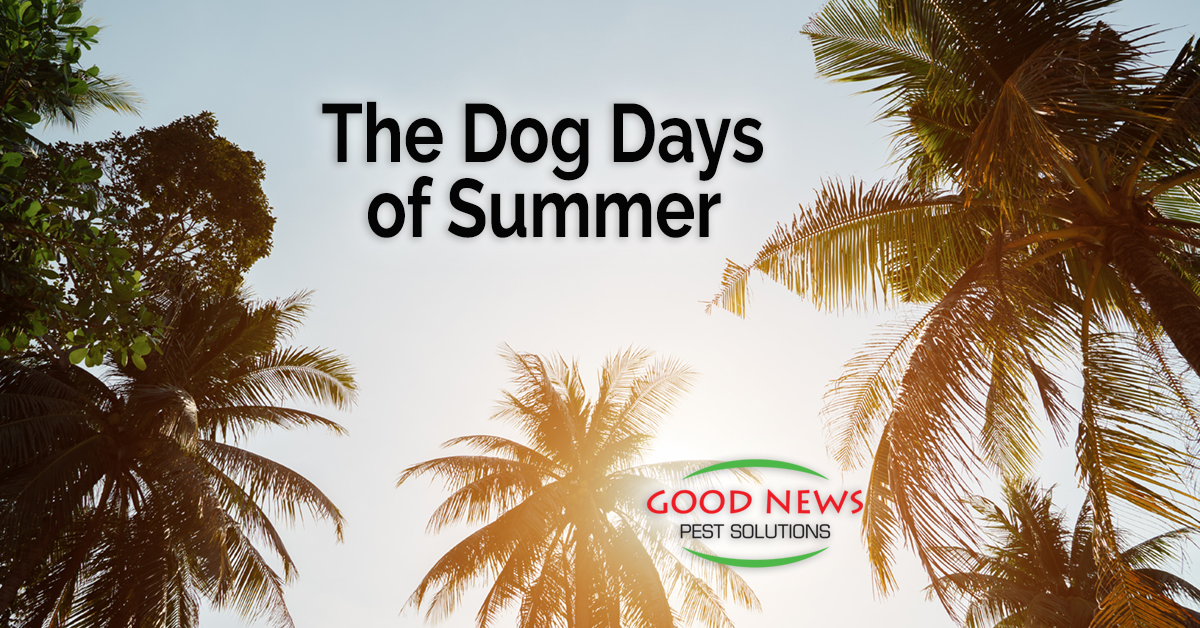
The Dog Days of Summer
When we’re stepping out of our homes these days of unseasonably high temperatures and we are almost immediately wiping our brows, it’s easy to understand why the ancient Romans called this time of year the “dog days of summer”.
Yes, that’s correct, it’s not a slang phrase from our parents’, or even grandparent’s’, generation, but goes back to ancient history! In fact, the Romans adopted it, as they did many things, from Greek tradition. Greek writer and philosopher Plutarch referred to the hot days of summer as “hēmerai kynades” nearly 2000 years ago.
Both of these ancient peoples noted that from late July through August the weather was the hottest and most humid. As they often did, they looked to the stars and observed that during that time, Sirius rose with the sun. So they concluded that the two stars – our sun and the dog star – rising together was providing twice as much heat!
We know now that such theories are not scientifically viable. But the phrase “dog days of summer” stayed in the common speech and was translated into English around the 1500’s. With the advent of the printing press, the idiom became cemented in English language tradition.
In an interesting plot, er, twist, the rotation of the earth has shifted those dog days of summer slightly earlier each year. For 2021, they began July 3rd and run until the second week in August.
Winding Down
Here in North America, the dog days of summer also tend to coincide with the last few days of free time for our children – a last push before they have to return to schoolwork and books. Even though it’s warmer and more humid, we try to engage in some outdoor family activities. Things like barbeques, pool parties, baseball, and picnics become very popular despite the elevated heat.
Maybe if the ancient Greeks looked at the situation now, they’d rephrase it as the “barbeque days of summer.” That has a nice ring to it.
Unfortunately, the heat does nothing to keep mosquitoes away from your yard and family. In fact, sometimes it seems they thrive in it! That’s not entirely untrue, as warmer weather induces them to lay eggs faster. And the combination of our Florida humidity and daily rains means their life cycle is even shorter.
There is good news, though. Mosquitoes don’t have to suck your blood to survive or reproduce. They can survive just as well on a strictly vegan diet – which is where our exclusive No Bite Zones Mosquito Protection Program comes into play. Not only does it put the pregnant mommas on a diet… It also works on the eggs they’re about to lay, creating a whole generation of non-biting mosquitoes.
Instead of being eaten alive by mosquitoes, your family is enjoying the outdoors, and the mosquitoes are allowed to fulfill their God-given purpose of pollination. That’s what we call a win-win.
If you’d like to learn more or schedule an appointment for a technician to come out to your home, just give us a call!
« Back to BlogProudly Serving
Sun City Center, Ruskin, Palmetto, Parrish, Ellenton, Bradenton, Anna Maria, Holmes Beach, Bradenton Beach, Longboat Key, Lakewood Ranch, University Park, Myakka City, Sarasota, Siesta Key, Osprey, Nokomis, Casey Key, Venice, Englewood, North Port, Port Charlotte, Punta Gorda, Arcadia
Things You Can Do
Pay Your Bill Online
Leave Us a Review
Request a Free* Termite Inspection
Stop Mosquito Bites
Get Rid of Rodents
Get a Termite Damage Warranty
Get Pest Control for Your Attic
Get Pest Control for Your Business Request Prayer
Corporate Address
1080 Enterprise Court, Ste A
North Venice, FL 34275
Call Now: (941) 412-9610
Text: (941) 412-9610
Fax: (941) 412-0080
